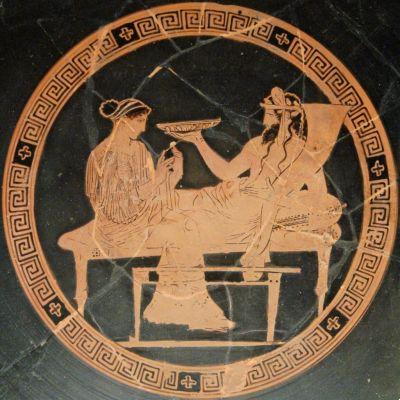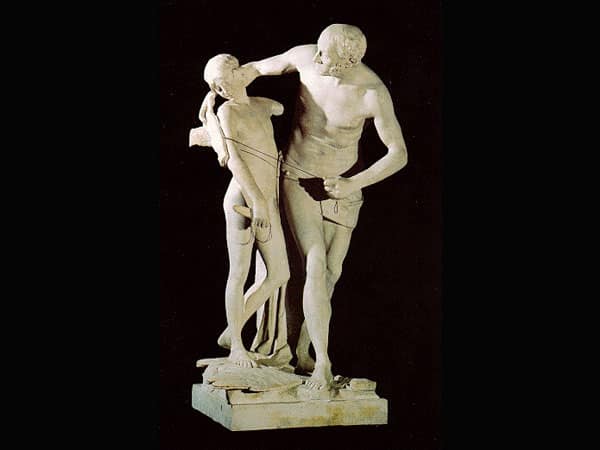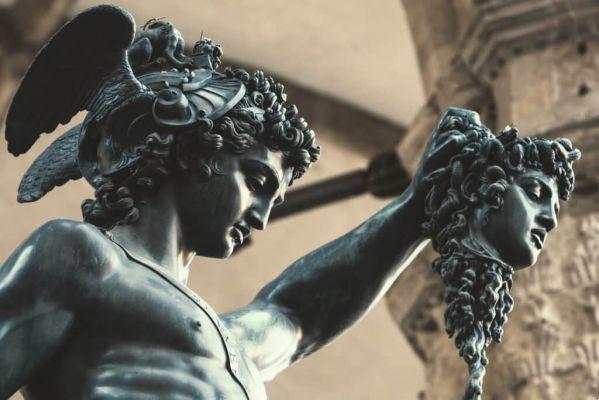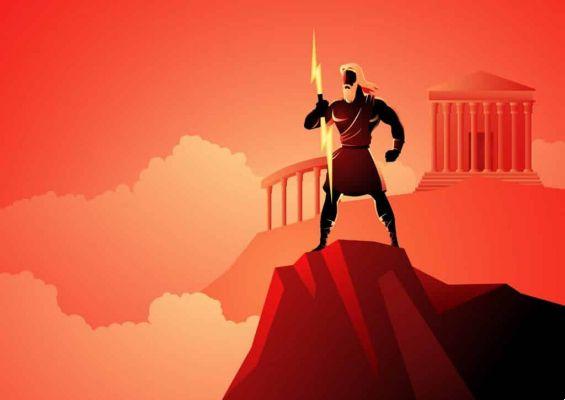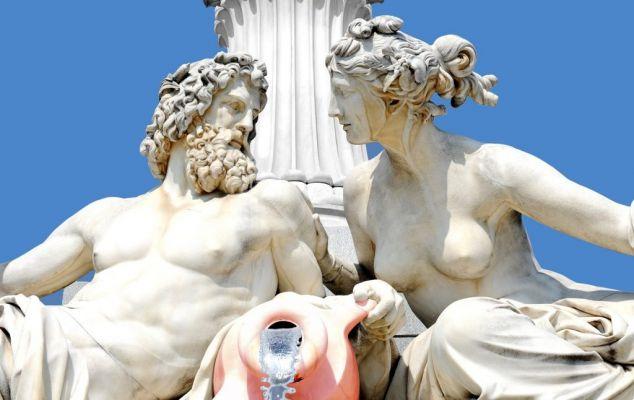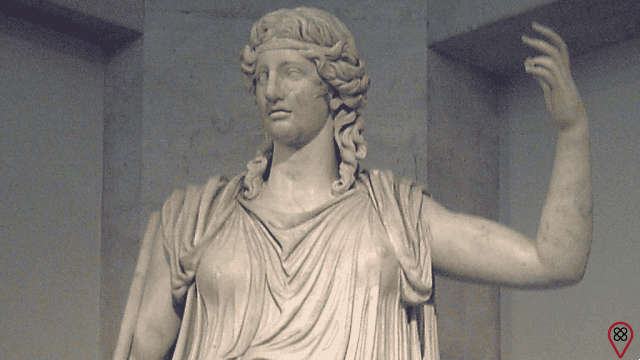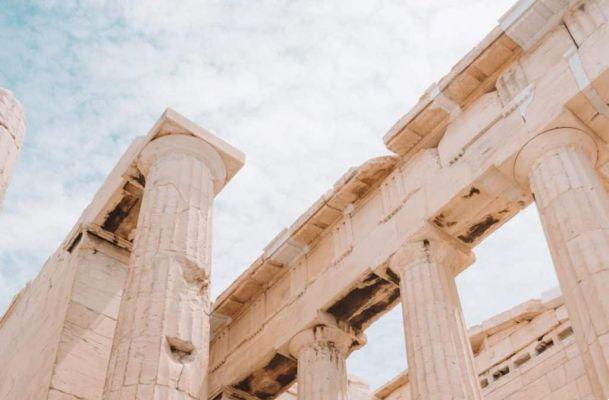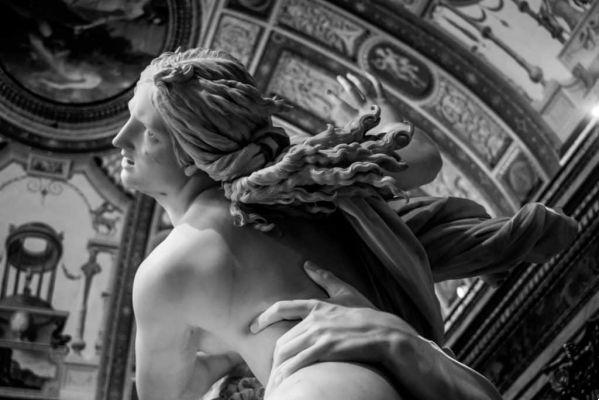Apollo is one of the most beautiful gods on Olympus. Considered god of the Sun, he is also known as the god of light, heat and truth: where there is light, there is clarity. He is also seen as the god of physical beauty and godfather of artistic branches: painting, poetry and music. He is the famous god of the lyre and song.
For being god of the Sun, the fruits that this star provides were attributed to him, as factors related to agriculture and the land. In ancient times, some cities in Greece consecrated their first field crops to Apollo. In addition, he is known to many as the god who protects herds. Among the things associated with him, the sun god is still considered the god who drives away all evil, plagues and diseases from human beings, despite the god of medicine being Asclepius, his son.
Apollo is famous for having some feats that gave him evidence within Greco-Roman mythology. He was considered a warrior for having killed, with just one arrow, Python, a fearsome female dragon. And he still gained relevance for having defeated Aloadas, one of the giant sons of Poseidon, who tried to reach Olympus. As well as the death of the dragon, Apollo slew Aloadas with his bow and arrows.
Apollo's history and origin
The birth
Apollo is the son of Zeus and Leto: the god of gods in Greek mythology and the daughter of Phoebe and Sky, the Titans. The sun god has a twin sister named Artemis, the goddess of the moon, wild animals, hunting and magic. According to Greco-Roman mythology, the god of the sun and the god of the moon were obligatorily twins.

Apollo had his birth extremely troubled, as Hera, the goddess of motherhood and wife of Zeus, was very vengeful and was very jealous of her husband. With all her anger, Hera did everything to make it impossible for Leto to deliver and prevent the birth of the babies. She imprisoned Ilithia, the goddess who facilitated and assisted women in childbirth. As the people of the time greatly feared Hera's wrath, no one in the city sheltered Leto or helped him in any way. However, the brave mother managed to give birth to Apollo and Artemis on a floating island that was soon called Delos. However, the arrival of the twin gods into the world was not easy, as Leto suffered for nine days and nine nights, until Hera released Illytia upon receiving offerings. The first god to come into the world was Artemis, then Apollo.
Childhood

Apollo was not breastfed! The goddess Themis fed the baby ambrosia nectar, known today as the delicacy of the gods, causing him to automatically become a man. In her first year of life, Apollo discovered that Hera had sent Python, a female dragon, to kill her mother; Upon learning of this plan, with just one arrow, the god killed the feared animal. This feat was celebrated for a long time by the population.
In addition to Artemis, Apollo also had other siblings: Athena, Ares, Hermes and Hephaestus.
Start of the holy site: Oracle of Delphi
Apollo took possession of Themis and created a piece of furniture in which Pythia, his priestess, snuggled to practice her predictions (such furniture was called a tripod). This environment, where there was the tripod, later became the site of one of Apollo's greatest exploits, namely Delphi, the death of Python.
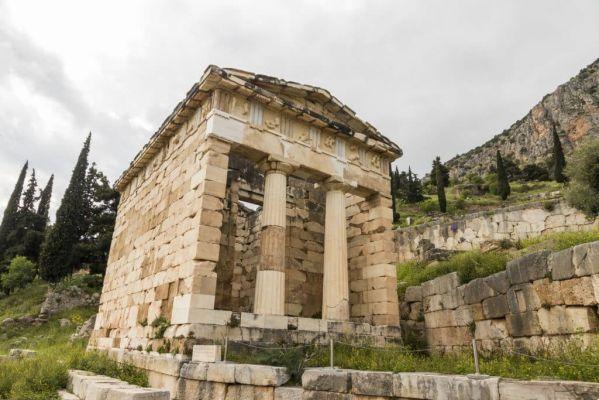
Delphi is the place where the altar for the worship of Apollo was built, but at that time of construction there were no priests to contemplate the temple. Shortly after Delphi was built, a ship appeared nearby and Apollo, in the form of a dolphin, warned the sailors that from that moment on they would be the priests who would occupy the temple. However, the sun god was not always in Delphi. Some legends say that when autumn arrived, Apollo went to a mythical country where there was a great people who worshiped him. As soon as the season ended and the services ceased, Apollo returned to Delphi, when it was already spring. Delphi was the great temple of Apollo!
War with love cupid
Apollo didn't have much luck in his love life. In the course of his life, he became involved with several women and men. But one of his most remarkable stories was the plot of his romantic relationship with a nymph named Daphne, daughter of a king called Peneus.

As the sun god was very good with bow and arrows, he decided to challenge the god who was cupid of love, with the certainty that his skills and his arrows were more accurate and powerful than his. But the god Cupid, with his great power, proved to Apollo that he was much more powerful: he hit the sun god's heart with a large golden arrow, making him love Daphne very much, but, in return, he hit the nymph with a lead arrow so that she would disown Apollo. With that, Daphne denied Apollo's love, until the god turned to her father, asking him to curse her and turn into a laurel tree.
Apollo still had other love misadventures in which he always ended up cursing his partners in some way. As with the seer Cassandra, who lost her power of persuasion for not keeping her word to stay with the god. From the relations with Cyrene and Urania, Apollo had many children, but he never married any. Cyrene was a nymph and Urania was an astronomer muse.
exploits of Apollo

In addition to killing Python and Aladoas, Apollo had a big fight with Titius, a giant who was also the son of Zeus. The intrigue between the half-brothers began when Titius harassed Leto, mother of the sun god; resulting in Tício's death. Still on this list of wars with Apollo, Forbas was a bully who incited fights on the way to Delphi. Because he was extremely strong, no one could beat him. But Apollo came! He disguised himself as an athlete and killed Forbas with just one punch.
Apollo helped the warriors in the Trojan War and saved many men. His protection was always ahead of those who held his esteem, and so the walls of Troy were defeated, just as Paris hit the great Achilles heel with just one arrow, emerging victorious from the combat. For having helped the Trojans to win their battles, the people laid laurels at his feet; plant that to this day represents the victories in the Olympic games.
apollo myth

Now that you know a little about the history and origin of Apollo, you know that his myth was totally dual in relation to human nature. Apollo was a god who did good and evil, it all depended on the situation and his will. As god of the Sun, of agriculture, as protector of livestock and the arts, he did good by generating fortunes and happiness, but at the same time he took the lives of those who did not like him or disrespected him with his accurate aim and his bow and arrows.
But, in any case, he was one of the most relevant gods of Greco-Roman mythology, being defined as a being that could threaten but also protect. Regarded as the strength and light of the Sun, he acted as an inspirer of the arts and was a source of fear to the other gods. Within their bravery, only his parents could contain his wants, joys and wraths. Within the duality of his exploits, Apollo was the god of disease but he was also the god of healing.
Its myth has been worked on for many years by philosophers and researchers, whether religious, artistic or simply curious. The purpose of reaching a greater understanding of the history of the Sun God is to understand the diversity of behaviors of human life, nature and society as a whole.
Cult of Apollo
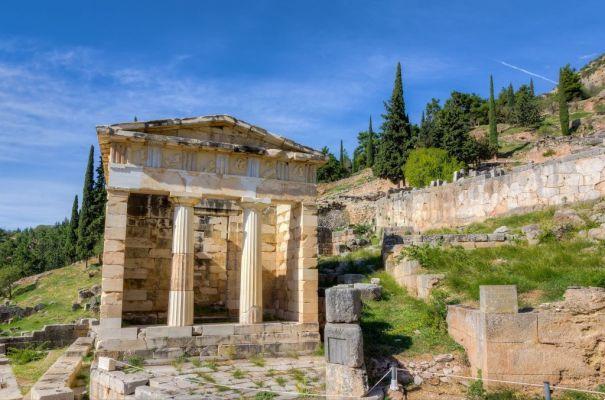
Apollo cults initially took place in Delphi. Their rites were watered with musical activities, dance, sacrifices, with the aim of purification, processions, among other practices. Apollo cults were not always the same; they varied according to the places or the time (if we stop to analyze the historical context of its history that has changed over the years).
Some legends claim that Delphi was the first place where a cult of Apollo took place, but some archaeologists claim that there was a temple in Naxos, around the XNUMXth century BC.
Apollo Archetype
The Greek god of the Sun has great emphasis in Greco-Roman mythology, as mentioned earlier. However, he still possessed a greater strength for being one of the most mentioned gods in the Iliad.
Apollo was a model of masculine aspects that made him powerful in any situation. He possessed beauty, heightened sexuality and strength. He had a very strong emotional distance, so much so that the god never married and had many mistresses while maintaining steady relationships with certain women. The difficulty of maintaining a lasting bond could be a result of the love denials experienced previously, with Daphne and Cassandra.
You may also like
- Discover Greek Mythology: the culture that emerged in Ancient Greece
- Learn all about Mabon, the Autumnal Equinox and Celtic Reiki!
- Be impressed by the history of the Olympics: how did it all start?
His explosive behavior pattern was a question to be questioned, as it was logical the size of his power, but he always used it as he wanted, never thinking about the good of others. Even the benefits he brought to the population carried ulterior motives. His frustrations were discounted in arrows, but even so, he had great relevance in the victory of many peoples. Within his self-righteous injustice, Apollo was also a righteous god who healed the sick and delivered people from countless plagues and diseases.
image of Apollo
Apollo is represented in a very simple way: a young, beautiful man, totally naked and who passes the perception that he is the Sun itself. The objects that became his symbols are the bow and arrows, the lyre, the laurels and the palm tree.
Now that you know a little more about the history of Apollo, share this article with your friends so that they too can learn about Greco-Roman mythology!



